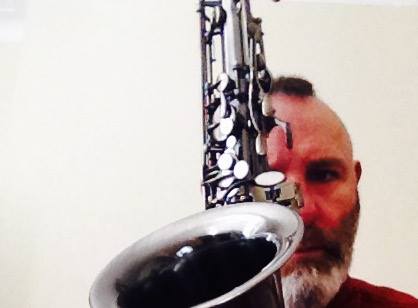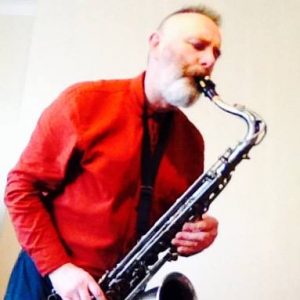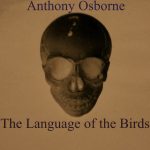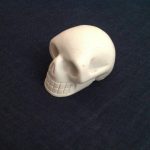
As a musician, Anthony Osborne is, in his own words, “a free jazz saxophonist and noisemaker. He likes to work in the intersections between free jazz/free improvisation, noise and drone. He is in eternal pursuit of the ecstatic.” Throw in some poetry or visuals (as in the Union Furnace or Black Howler projects) or favourite obsession James Joyce, and you may get a glimpse of the ingredients but the final result is still likely unimaginable, possibly for some unlistenable, but for those that do, often unexpectedly profound.
1. Name an experience that contributed to your becoming a musician?
The very first time I can remember getting wildly enthusiastic about a piece of music was the time my older brother (hi, Mark!) borrowed a copy of Lou Reed’s Transformer from a friend of his and brought it home and played it – this would be 1972 or 73. He and his friends were all Bowie fanatics – I imagine I would have heard a lot of music previously, TV, radio, whatever, but certainly none of it made much of an impression and none of it has stuck in my memory. The Bowie stuff left me largely unmoved too, at that time, but something about Transformer really got caught in my filters. I can’t explain it – I loved the sound of the album (the Bowie/Ronson production is beautiful, best production Reed ever had and far better than Bowie’s own albums up to that point … in my far from humble opinion), I loved the songs (precocious as I was, at that time, around 10 years of age, the sex and drugs references went straight over my head), I loved Lou Reed’s voice, I loved the cover … from out of the blue I very suddenly and dramatically fell head over heels in love with an art form. Everything about the album struck me as wonderful and magical and beguiling – and I must say it still does.
Although I have travelled very far from rock’n’roll and pop music, both as a listener and as a musician, I still very much love that album. It was the start of it all for me, really. I wanted to hear everything by this strange creature Lou Reed – I think Berlin had just come out so I avidly consumed the solo albums and then went searching for everything by the Velvet Underground. From there I grasped the concept of an underground, of marginalised culture, of an avant garde – the Velvets were my conduit to Krautrock , punk, noise, electronics, free jazz, drone, Minimalism … everything kind of springs from there, really, and the impulse to get involved and make it myself originates there too. The punk maxim of “do it yourself”. And all that sprung from my fugitive listening to Transformer … oh God, what if my brother had brought home an Eagles album instead?
There was an aftershock, of a kind, when my brother bought a copy of Iggy and the Stooges’ Raw Power, again due to the Bowie patronage … this led to my discovery of the Stooges back catalogue, thus Funhouse and my first ever exposure to skronk sax. David Bowie has a lot to answer for, frankly.
2. What was the first music you ever bought, and the most recent?
This refers back to my first answer – the very first record I ever bought was my own copy of Transformer … long before I owned my own record player, I was buying records. My brother had very soon bought his own copy and was buying Lou Reed and Velvet Underground stuff and I started to get my own copies, and gloat over them like a miser. I’d pull out my copy of Transformer and look at it frequently … I think it’s a great piece of design, that cover, front and back.
The most recent? The last piece of music I actually bought is the album Apparitions by the Dikeman Lisle Serries Webster Quartet, on CD, from the merch table at a gig. A two sax, drums and guitar line-up – free jazz, free improvisation … very good. Released on the A New Wave Of Jazz Label, which consistently delivers the goods.
The last music I actually received, due to the time lag of my CD getting lost in the post for over a week, was Breathing In The Walls by Tiger Hatchery … a raucous free jazz trio based, I believe, in Chicago – sax, bass, drums, informed by punk and noise as well as free jazz … released on the mighty ESP Disk’ label and very good too.
Both albums fairly recent and contemporary, I’m pleased to say … see, I don’t just sit around listening to my Albert Ayler and Velvet Underground albums, weeping that the music died in 1970. Although, to be fair, there is a bit of that.
3. What’s the balance of preparation vs. improvisation for the average live set or recording?
I’m not sure what an average live set is – I’ve played as part of an ensemble in a squat in Limehouse without a ceiling and on a disused minesweeper from WWII moored somewhere near Deptford, and in art galleries, I’ve played solo sets at a Winter Solstice celebration besides a roaring bonfire in someone’s back garden and at afternoon gigs in a public park.
 It tends to be a very straight split between the sax and the electronics … when it comes to recording, I will record and rerecord the electronics a lot, there is a lot of sampling, editing, processing, mutating, just playing around with the sound. I am a perfectionist in many ways, I will spend hours with the sound, and often delete those hours worth of work, sometimes the layers of sound will build up to the point where it becomes a mess. I must say, sometimes it’s a mess I quite like and will keep, sometimes not. It’s a mix of analogue and digital equipment, and the recording and processing is all part of the composition. When I play live with the electronics (a very basic set-up, I might add) it tends to be improvised because I don’t use midi or laptops or anything like that – I might use a prerecorded track as a background but the electronics, small handheld analogue devices mainly, are all used live. I am drawn to noise and drones. I am not a purist about the electronics except when it comes to the drones … the drones have a spiritual content for me, I am after a devotional, meditative aspect. Although even with the drones I will use many different sound sources to get what I’m after.
It tends to be a very straight split between the sax and the electronics … when it comes to recording, I will record and rerecord the electronics a lot, there is a lot of sampling, editing, processing, mutating, just playing around with the sound. I am a perfectionist in many ways, I will spend hours with the sound, and often delete those hours worth of work, sometimes the layers of sound will build up to the point where it becomes a mess. I must say, sometimes it’s a mess I quite like and will keep, sometimes not. It’s a mix of analogue and digital equipment, and the recording and processing is all part of the composition. When I play live with the electronics (a very basic set-up, I might add) it tends to be improvised because I don’t use midi or laptops or anything like that – I might use a prerecorded track as a background but the electronics, small handheld analogue devices mainly, are all used live. I am drawn to noise and drones. I am not a purist about the electronics except when it comes to the drones … the drones have a spiritual content for me, I am after a devotional, meditative aspect. Although even with the drones I will use many different sound sources to get what I’m after.
The sax is a very different matter – both when I’m recording and playing live it is all improvised. I am dedicated to complete spontaneity, it’s the only way I enjoy it. When I record my sax playing I will tend to use it exactly as it was recorded at the time … I will admit, under intense interrogation, to an occasional use of minimal editing or a slight tweaking of the sound but mainly it is used as it was at the time. If I am dissatisfied with something I will tend to delete the whole thing. I’m something of a purist, indeed a Puritan, when it comes to improvisation … it has to be totally spontaneous and live. I will very occasionally use a phrase I have thought up previously but that is rare. Like the drones, when I play sax, although this may not be immediately apparent to most people (it may well, to many, sound like an ugly squall coming out of the bell) it is intended to have some kind of spiritual intent behind it, some kind of calling out to the cosmos or inviting the cosmos to speak through the horn. I am an Animist, a Pantheist, I wish to connect to something “out there” and for it to communicate back. Everything is sound, all matter is vibration. I believe that music is indeed the healing force of the universe. I am a mystic, not a Materialist … or, as some of my friends would see it, a crank. For me the sax playing is the very heart of my musical process … it is a much more personal and intimate activity, very physical.
My roots, the playing I heard when I was first contemplating playing sax went very quickly from No Wave and post punk stuff to free jazz, fire music, the New Thing. It seems the natural order for me – it’s the sound that first moved me, that took the top of my head off. It’s all about the sound for me. And it’s a cantankerous beast, the saxophone – some days it flows, some days there is nothing you can do, you can’t play anything worth a damn. But y’know, as Beckett very wisely wrote: “No matter. Try again. Fail again. Fail better”.
4. What or who do you to for inspiration when you need it?
There is a certain siren’s song that I would follow anywhere, a sound, a tone, a frequency – I have heard iterations of it in sax sounds, drones, electronics … it affects me in a very direct physical way, and emotionally and spiritually, too. That remains a very intense inspiration.
I gain much inspiration from non-musical sources … James Joyce, both his writing and his example of how to live as an artist, is a very powerful totemic figure for me. Ulysses and Finnegans Wake – both very influential on how I think about structure and form, and just in the utter wonderfulness of them. The films of Sergei Eisenstein and Kenneth Anger also, are very powerful sources of inspiration – I studied film and started out as a filmmaker, and am rigorously schooled in the various theories of montage; both those filmmakers had an enormous impact on me, in terms of structure and the arrangement and framing of the image, of sequence, of material … there is no direct correlation between film and the music I make but their examples as artists and how to deal with the plasticity of the medium is very interesting to me. The Burroughsian cut-ups also function in that manner.
And the world around me … both natural and manmade. I live in London and am surrounded by the din and blare of city life, but am fortunate to live very close to a large park teeming with life, a lot of birds, dogs, ambient sounds … I register everything. It all goes in and must have some impact on what comes out. Every second of my life influences me – memories, emotions, stuff I’m dealing with … it all goes in and, in some indefinable way, comes out.
5. What (if any) superstitions or rituals do you have? (around performance, recording, everyday life?)
Oh God, that opens up a can of worms! I am a terribly superstitious person and believe in all manner of notions, customs, shibboleths … I am the despair of my rational, Materialist friends when it comes to this stuff, both when it comes to superstition and my spiritual/religious beliefs. I have the usual qualms about stepping under ladders or breaking mirrors, you have to be very careful around mirrors in general – you don’t just look into them, they look into you.
When I record, not to sound like some old hippy, I will prepare and cleanse the space with music – a singing bowl, and a Ting-Sha in the corners of the room. I believe very much in the genius loci, the spirit of a place. Every location has an individual presence, there are an infinite number of variables – the people present, how I and the sounds I am making interact with everything. Playing live, I try to stay sensitive to all of that but it is really out of my control – I have internal rituals that I attend to, just in terms of preparing myself to play, nothing heavy, just some form of gathering myself to perform.
I also have a dizzying number of spiritual beliefs and practices – some of which impact how I approach making music because they impact how I approach life. If I listed them all it would take up a ridiculous amount of space and make me sound completely mad. I believe in Magick as an active force in the cosmos, and try to interact with it … one is sensitive to it or not, I think of it when making music and when just living what I laughably think of as my life.
6. Where do you stand on the streaming/downloading/file-sharing/musicians-not-getting-paid-for-their-music debates?
That’s a very difficult question – on one level, of course musicians should get paid for their work, for the time, the energy, the craft that goes into it. The streaming thing is more clear cut … if big corporations are making money off music, that should be shared more equally with the people who actually make the music. Something like Bandcamp, which I use as both a musician and as a listener seems more of a workable solution, I retain the control over my own work, I can charge or not charge what I wish, I have no problems with that. I have, I must admit, downloaded stuff for free when there is a choice to do that … but only from musicians whose work |I have paid for as well.
I’m old-fashioned, I am still connected to the idea of a physical object … vinyl, CD cassette, I like a physical thing. I still buy all those things, if there is a physical release, I’ll always purchase it over download only. But I know people like free stuff … the file-sharing, downloading question is just the latest version of the “home taping is killing music” nonsense that the industry indulges in. My attitude, in those far off days, was that coked-up airheads in studios in LA were the ones actually killing music. The same used to apply to bootleggers … very wealthy rock stars or record labels taking people to court … people who bought bootlegs were the people loyally buying every legitimate release when it came out, even when it was rubbish. It’s basically the same now, people download for free here, pay there, share files … good luck to them. If anyone takes the time to download my stuff, I’m happy … I’m just flattered that anyone would want to listen to the music I make. If I was doing this for the money I’m clearly in the wrong job!
7. If money and time were no object, what would your next project be?
I would like to upgrade my equipment for a start, bigger and better electronics and recording equipment – ideally I would like to spend time in a really well setup studio and also to build and equip a studio to record whenever I wanted, to get people in to collaborate with, and with no time constraints, that would be nice.
If I ever came into serious money I would probably go on a buying spree for new saxophones too – although they may no longer be the best on the market, according to some, I would get a Selmer tenor just for the mythic resonance … c’mon, it’s the sax Ayler and Coltrane and Sanders played, of course I’d love one. There are some very nice soprano saxes out there, too, that I covet.
If money and time were no object, I’d use it to buy the space and the peace and quiet in order to work, and be able to travel more to play with other people. I love to play with other musicians and so rarely get the chance. I would like to put a regular working duo or trio together and take that out live.
At the moment I am working on some graphic scores – slow and frustrating work because I keep tearing them up when I’m finished with them … I haven’t produced any I’m really satisfied with yet. When I do, though, I would love to have the means to put a large ensemble together to realise the scores. I have ideas about combining improvisation and composition and it would be very interesting to see them in action. Praxis, not just theory. So, if there any eccentric billionaires out there reading this, do please get in touch.
–
Photos by Anthony Osborne
https://anthonyosborne.bandcamp.com/
https://soundcloud.com/anthony-osborne-12



